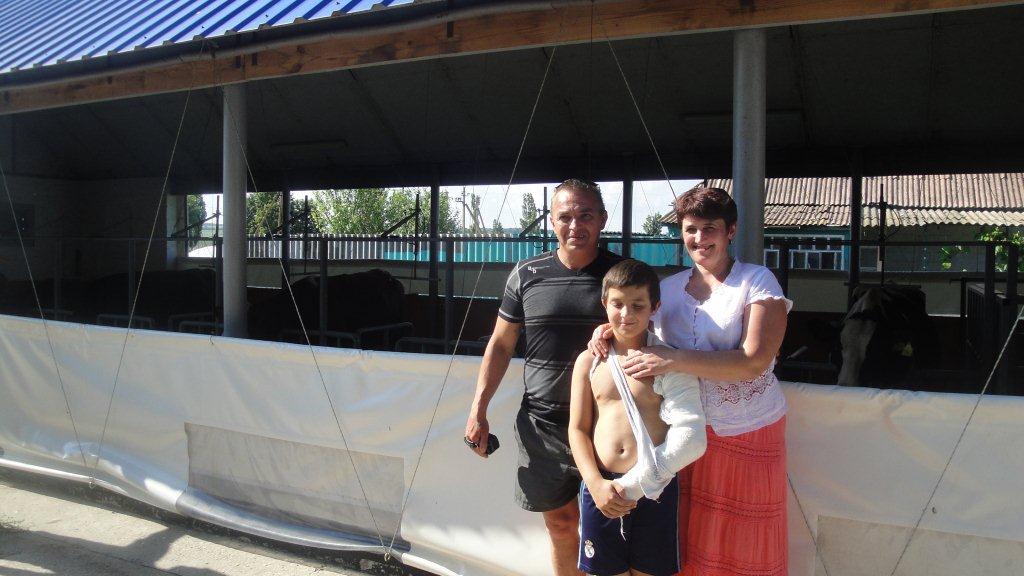I recently had the opportunity to visit Heifer projects in the eastern European country of Ukraine. It was really my first visit to Heifer projects outside Africa, and though it was a week of heavy travel across the country, I was grateful for the chance to see smallholder farmers in another part of the world and begin to understand the challenges that they faced. From the western city of Dnipopetrovsk to the eastern city of Lviv and in between, we met men and women, all farmers and members of co-ops producing dairy products, strawberries and herbal teas. I was amazed by the simple genius of their ideas and the enterprise with which they pursued it. I was warmed by their hospitality and kindness. I was intrigued by the fact that, wherever I travel around the world, people have the same simple dreams for themselves and their families: food on the table, clothes on their backs, health, education and gainful employment.
 Farmers worked the field as we drove through rural Ukraine. Photo courtesy of Heifer International.
Farmers worked the field as we drove through rural Ukraine. Photo courtesy of Heifer International.As we drove across the Ukrainian countryside, I was struck by the sight of rural people farming along the roadsides. This was an image I had only ever seen in Africa, so it was startling to me to see men and women holding hoes and bent over their farms; change the color of their skin and we might as well be in any part of rural Africa. Though the heat of the sun may be more merciful here, and the ground less unyielding, their purpose was the same; to grow food for themselves and their families.
Smallholder farmers face enormous challenges growing the world’s food, and at Heifer International, understanding these challenges deeply is key to our work. We must help farmers make the shift from only feeding their own families to feeding a growing global population while cooling the Earth. In order to make this shift, smallholder farmers need to see farming as an enterprise.
Unfortunately, smallholder farmers don’t often think of themselves as entrepreneurs. Yet every day they make decisions no less important and consequential than the ones being made at the world’s most sophisticated stock exchanges; decisions about portfolio management (which crops to plant), risk (pests, weather), investments (land, labor, seeds, energy and other inputs) and returns, costs and benefits, market demand, profit and loss, credit, product diversification, revenue projections, all the while keeping a watchful eye on changing global climate patterns and the added uncertainty that brings. They may not know the business terms, but they understand the concepts just the same.
 Antonia and her family. Photo courtesy of Heifer International.
Antonia and her family. Photo courtesy of Heifer International.In Heifer’s Theory of Change, women are a critical lever for multiplying our impact. In Ukraine, this theory is evident. From my travels, I will remember women like Antonina Kurylenko. Through a project managed by Heifer, Antonina and her husband took a loan two years ago to convert a former Soviet-era collective farm into the family farm, which now houses their 10 cows. They started with five cows, and their investment has grown in a few years. Their profits have also grown, as they are now shareholders in a nearby dairy cooperative Heifer helped establish. Increased profits mean better lives for Antonina and her three children and two grandchildren. They have a couple more years to pay off their loan, but for them it has been a worthwhile investment. Antonina is a woman who seems to do everything emphatically and deliberately, from the way she flicks the pests off her cows to the choice of music she plays them in their barn. “It helps improve their production,” she insists.
Improving production and productivity on limited resources is key to how we are going to feed a projected global population of nine billion people in 2050. On 10 hectares of carefully selected land owned by a farmers co-op in western Ukraine, Heifer has partnered with Danone (the parent company of the U.S. dairy company known as Dannon) to help a group of farmers grow strawberries for the company’s yogurt products. On this small parcel of land, efficiency and productivity are very important. Farmers pay close attention to the quality of strawberries planted, when they are planted to avoid frost, how they are irrigated, when the farm is weeded and where the labor for this manual task is obtained and at what cost. There are dozens of details to be carefully attended to in order to ensure the strawberries are picked at just the right time, stored properly and sent off to the processor to be put into yogurt. Initially, the two-year-old project was supposed to grow enough strawberries to meet 60% of Danone’s demand, but the market has grown quickly, and farmer capacity is challenged to grow with it. Plans for expansion are underway, which means more work for farmers and also more profit. This partnership is a win/win for farmers who need to earn a good living and for a company that needs to source healthy, wholesome food for its demanding customers.
My trip to Ukraine was a master class in learning more about Heifer's work and the challenges of development, especially for smallholder farmers the world over. We covered 7,000 miles in 10 flights in 6 days. It was physically grueling, but mentally rewarding. I feel grateful for the experience. I've returned to my office with renewed conviction that smallholder farmers will feed the world, and Heifer will play an important role. I’m excited to play my part.